Saturday, May 17, 2008
Ember Saturday In Whitsuntide
Today is also an Ember Day, the last one until September.
Tomorrow is Trinity Sunday, with Corpus Christi next Thursday, and the Feast of the Sacred Heart on the Friday 8 days after Corpus Christi (and the feast of the Immaculate Heart in the Novus Ordo on the day after, a change I rather like, as it unites the feasts of Two Hearts of Jesus and Mary).
And after that, it is the unrecognized liturgical summer time, when prelates hie to their mountaintop retreats.
Tomorrow is Trinity Sunday, with Corpus Christi next Thursday, and the Feast of the Sacred Heart on the Friday 8 days after Corpus Christi (and the feast of the Immaculate Heart in the Novus Ordo on the day after, a change I rather like, as it unites the feasts of Two Hearts of Jesus and Mary).
And after that, it is the unrecognized liturgical summer time, when prelates hie to their mountaintop retreats.
Labels: Restorationists
Our Blessed Lady's Saturday: May Edition
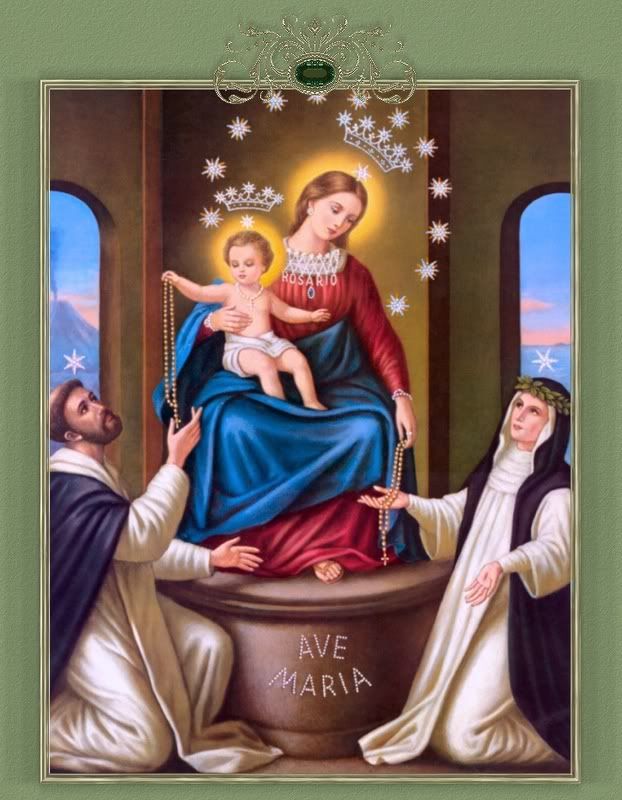
From The Glories Of Mary, by Saint Alphonsus Liguori:
O greatest and most sublime of all creatures, most sacred Virgin, I salute thee from this earth—I, a miserable and unfortunate rebel against my God, who deserve chastisements, not favors, justice, and not mercy.
O Lady, I say not this because I doubt thy compassion. I know that the greater thou art the more thou dost glory in being benign. I know that thou rejoicest that thou art so rich, because thou art thus enabled to succor us poor miserable creatures. I know that the greater is the poverty of those who have recourse to thee, the more dost thou exert thyself to protect and save them.
O my Mother, it was thou who didst one day weep over thy Son who died for me. Offer, I beseech thee, thy tears to God, and by these obtain for me true sorrow for my sins. Sinners then afflicted thee so much, and I, by my crimes, have done the same.
Obtain for me, O Mary, that at least from this day forward I may not continue to afflict thee and thy Son by my ingratitude. What would thy sorrow avail me if I continued to be ungrateful to thee? To what purpose would thy mercy have been shown me, if again I was unfaithful and lost? No, my Queen, permit it not; thou hast supplied for all my shortcomings.
Thou obtainest from God what thou wilt. Thou grantest the prayers of all. I ask of thee two graces; I expect them from thee, and will not be satisfied with less. Obtain for me that I may be faithful to God, and no more offend him, and love him during the remainder of my life as much as I have offended him.
Amen.
Labels: Restorationists
Friday, May 16, 2008
Appreciating
When a new product seizes my attention, I generally give it a mention. yesterday, I was in the North End, searching out lunch, and made a new discovery. I have always liked the combination of rosemary and sea salt. And I am fond of foccacia.
You know the New York Deli Style Bagel Chips, and Pita Chips? They come in a bag and are quite good as platforms for some cream cheese-based dip. Well, they have a new addition to the line:
New York Deli Style Rosemary and Sea Salt Foccacia Sticks!
I can't find a link for them, or I would post it.
Just by themselves, they are great. Add a little fresh bruschetta to the tops, and we are talking terrific!
Seek these things out. They are well worth it, especially if you are challenged by the meatless ember days requirement.
You know the New York Deli Style Bagel Chips, and Pita Chips? They come in a bag and are quite good as platforms for some cream cheese-based dip. Well, they have a new addition to the line:
New York Deli Style Rosemary and Sea Salt Foccacia Sticks!
I can't find a link for them, or I would post it.
Just by themselves, they are great. Add a little fresh bruschetta to the tops, and we are talking terrific!
Seek these things out. They are well worth it, especially if you are challenged by the meatless ember days requirement.
Labels: Food
Remember, It's Ember
Today is the Friday in the Whitsun Embertide. So, in addition to it being Friday, a day for traditional Catholics to stay away from meat (and ALL Catholics to observe as a day of penance), it is an especially solemn day for prayer, fasting, and almsgiving.
And tomorrow is an Ember Day, too!
And tomorrow is an Ember Day, too!
Labels: Restorationists
Marian Bonus
Friday At the Foot Of the Cross
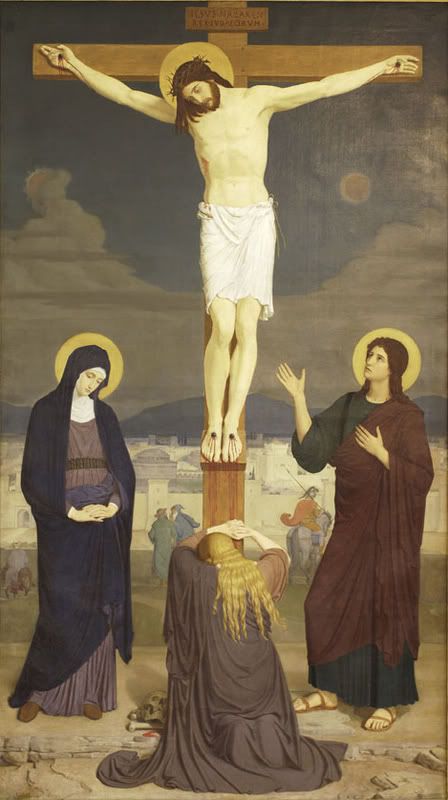
From The Holy Eucharist, by Saint Alphonsus Liguori:
O Heart of Jesus, abyss of mercy and love, how is it that, at the sight of the goodness Thou hast shown me, and of my ingratitude, I do not die of sorrow? Thou, O mv Saviour, after having given me my being, hast given me all Thy Blood and Thy life, giving Thyself up for my sake, to ignominy and death; and, not content with this, Thou hast invented the mode of sacrificing Thyself every day for me in the Holy Eucharist, not refusing to expose Thyself to the injuries which Thou shouldst receive, and which Thou didst foresee, in this Sacrament of love. O my God, how can I see myself so ungrateful to Thee without dying with confusion! O Lord, put an end, I pray Thee, to my ingratitude, by wounding my heart with Thy love, and making me entirely Thine. Remember the Blood and the tears that Thou hast shed for me, and forgive me. Oh, let not all Thy sufferings be lost upon me. But though Thou hast seen: how ungrateful and unworthy of Thy love I have been, yet Thou didst not cease to love me even when I did not love Thee, nor even desire that Thou shouldst love me; how much rather, then, may I not hope for Thy love, now that I desire and sigh after nothing but to love Thee, and to be loved by Thee. Oh, do Thou fully satisfy this my desire; or rather this Thy desire, for it is Thou that hast given it to me. Grant that this day may be the day of my thorough conversion; so that I may begin to love Thee, and may never cease to love Thee, my sovereign good. Make me die in everything to myself, in order that I may live only to Thee, and that I may always burn with Thy love.
O Mary, thy heart was the blessed altar that was always on fire with Divine love: my dearest Mother, make me like to thee; obtain this from thy Son, Who delights in honoring thee, by denying thee nothing that thou askest of Him.
Amen.
Labels: Restorationists
Daily Marian Prayer And Image During the Month Of May
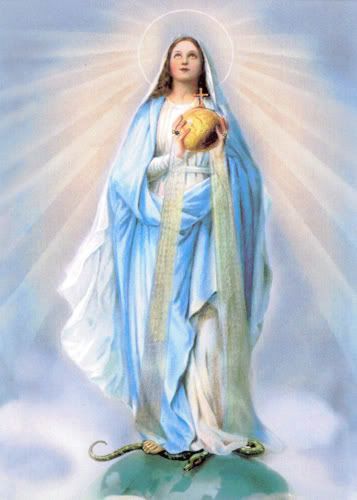
From The Glories Of Mary, by Saint Alphonsus Liguori:
O my most sweet Lady, since thy office is, as William of Paris says, that of a mediatress between God and sinners ("Officium tuum est, mediam te interponere inter Deum et hominess"óDe Rhet. Div. c. 18), I will address thee in the words of St. Thomas of Villanova: "Fulfil thy office in my behalf, O tender advocate; do thy work ("Eja ergo advocate nostra . . . officium tuum imple, tuum opus exerce"óIn Nat. B. V. con. 3).
Say not that my cause is too difficult to gain; for I know, and all tell me so, that every cause, no matter how desperate, if undertaken by thee, is never, and never will be, lost. And will mine be lost? No, this I cannot fear. The only thing that I might fear is, that, on seeing the multitude of my sins, thou mightest not undertake my defence. But, on seeing thy immense mercy, and the very great desire of thy most sweet heart to help the most abandoned sinners, even this I cannot fear. And who was ever lost that had recourse to thee? Therefore I invoke thy aid, O my great advocate, my refuge, my hope, my mother Mary.
To thy hands do I entrust the cause of my eternal salvation. To thee do I commit my soul; it was lost, but thou hast to save it. I will always thank our Lord for having given me this great confidence in thee; and which, notwithstanding my unworthiness, I feel is an assurance of salvation. I have but one fear to afflict me, O beloved Queen, and that is, that I may one day, by my own negligence, lost this confidence in thee.
And therefore I implore thee, O Mary, by the love thou bearest to Jesus, thyself to preserve and increase in me more and more this sweet confidence in thy intercession, by which I hope most certainly to recover the divine friendship, that I have hitherto so madly despised and lost; and having recovered it, I hope, through thee, to preserve it; and preserving it by the same means, I hope at length to thank thee for it in heaven, and there to sing God's mercies and thine for all eternity.
Amen. This is my hope; thus may it be, thus will it be.
Labels: Restorationists
Thursday, May 15, 2008
Daily Marian Prayer and Image During the Month Of May
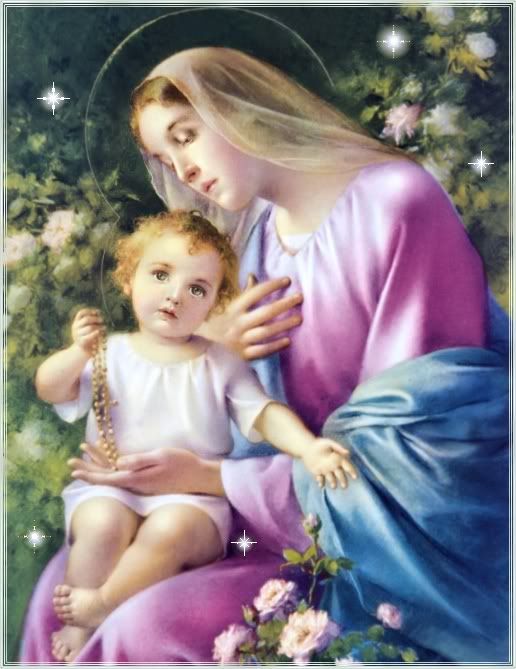
From The Glories Of Mary, by Saint Alphonsus Liguori:
O great Mother of my Lord, I see full well that my ingratitude towards God and thee, and this too for so many years, has merited for me that thou shouldst justly abandon me, and no longer have a care of me, for an ungrateful soul is no longer worthy of favors. But I, O Lady, have a high idea of thy great goodness; I believe it to be far greater than my ingratitude. Continue, then, O refuge of sinners, and cease not to help a miserable sinner who confides in thee.
O Mother of mercy, deign to extend a helping hand to a poor fallen wretch who asks thee for pity. O Mary, either defend me thyself, or tell me to whom I can have recourse, and who is better able to defend me than thou, and where I can find with God a more clement and powerful advocate than thou, who art his Mother. Then, in becoming the Mother of our Savior, wast thereby made the fitting instrument to save sinners, and wast given me for my salvation.
O Mary, save him who has recourse to thee. I deserve not thy love, but it is thine own desire to save sinners, that makes me hope that thou lovest me. And if thou lovest me, how can I be lost? O my own beloved Mother, if by thee I save my soul, as I hope to do, I shall no longer be ungrateful, I shall make up for my past ingratitude, and for the love which thou hast shown me, by my everlasting praises, and all the affections of my soul.
Happy in heaven, where thou reignest, and wilt reign forever. I shall always sing thy mercies, and kiss for eternity those loving hands which have delivered me from hell, as often as I have deserved it by my sins. O Mary, my liberator, my hope, my Queen, my advocate, my own sweet Mother, I love thee; I desire thy glory, and I love thee forever.
Amen.
Amen.
Thus do I hope.
Labels: Restorationists
Pauline Plenary Indulgence
The Holy Father has been pleased to offer a plenary indulgence to the faithful during the Year of St Paul, from June 29, 2008 to June 29, 2009. According to Zenit:
With the customary conditions, the faithful can obtain the indulgence by undertaking "a pious visit in the form of a pilgrimage to the papal basilica of St. Paul on Rome's Via Ostiense and [praying] in accordance with the intentions of the Supreme Pontiff," the decree explained.
It added: "In order that the prayers pronounced on these holy visits may lead and draw the souls of the faithful to a more intense veneration of the memory of St. Paul, the following conditions are laid down: The faithful, apart from pronouncing their own prayers before the altar of the Blessed Sacrament, [...] must go to the altar of the Confession and pray the 'Our Father' and the 'Creed,' adding pious invocations in honor of the Blessed Virgin Mary and St. Paul; and such acts of devotion must remain closely linked to the memory of the prince of the apostles, St. Peter."'
Those who are not in Rome can obtain the indulgence "if they participate devotedly in a religious function or in a pious exercise held publicly in honor of the Apostle of the Gentiles: on the days of the solemn opening and closing of the Pauline Year in any place of worship; on other days determined by the local ordinary, in holy places named for St. Paul and, for the good of the faithful, in other places designated by the ordinary."
With the customary conditions, the faithful can obtain the indulgence by undertaking "a pious visit in the form of a pilgrimage to the papal basilica of St. Paul on Rome's Via Ostiense and [praying] in accordance with the intentions of the Supreme Pontiff," the decree explained.
It added: "In order that the prayers pronounced on these holy visits may lead and draw the souls of the faithful to a more intense veneration of the memory of St. Paul, the following conditions are laid down: The faithful, apart from pronouncing their own prayers before the altar of the Blessed Sacrament, [...] must go to the altar of the Confession and pray the 'Our Father' and the 'Creed,' adding pious invocations in honor of the Blessed Virgin Mary and St. Paul; and such acts of devotion must remain closely linked to the memory of the prince of the apostles, St. Peter."'
Those who are not in Rome can obtain the indulgence "if they participate devotedly in a religious function or in a pious exercise held publicly in honor of the Apostle of the Gentiles: on the days of the solemn opening and closing of the Pauline Year in any place of worship; on other days determined by the local ordinary, in holy places named for St. Paul and, for the good of the faithful, in other places designated by the ordinary."
Labels: Restorationists
Thursday Is Never An Ember Day
Because of the institution of the Most Blessed Sacrament of the Altar on Maundy Thursday. So Thursday is always an interruption in an embertide.
Note: next Thursday is Corpus Christi, though even many traditional Mass locations choose to observe it on the following Sunday.
Note: next Thursday is Corpus Christi, though even many traditional Mass locations choose to observe it on the following Sunday.
Labels: Restorationists
Wednesday, May 14, 2008
You Can Now Buy A 4-CD Set Of the Holy Father Reciting the Rosary In Latin
Latin was chosen because of its universality.
Now, I tried to hunt it down on the Vatican Bookstore site, without success. For now, this might have to be an item you buy only there in Rome in person.
I have made some progress with my efforts, begun last year, to say the Rosary in Latin. The only big stumbling block has been my inability to find the Latin translation for the Prayer Before the Rosary ("O Queen of the Holy Rosary, thou hast deigned to come to Fatima to reveal to the three shepherd children the treasures of grace...".).
Of course, I have the Paters, Aves, and Minor Doxologies by rote, along with the Salve Regina, and have for some years now. I still have to read the Latin for the Fatima Prayer, the Apostles' Creed, the Prayer After the Rosary, the Prayer to Saint Michael, and the Guardian Angel Prayer, as well as the actual announcements of the Mysteries.
Progress comes slow.
I am just happy that, this week, we returned to the Angelus at 6, 12, and 6, and to the Salve Regina at the end of prayers. Doing the Regina Caeli in both roles was unusual, though it did help me to get a better grasp on its memorization, though I probably will not turn to it again until next Easter.
Now, I tried to hunt it down on the Vatican Bookstore site, without success. For now, this might have to be an item you buy only there in Rome in person.
I have made some progress with my efforts, begun last year, to say the Rosary in Latin. The only big stumbling block has been my inability to find the Latin translation for the Prayer Before the Rosary ("O Queen of the Holy Rosary, thou hast deigned to come to Fatima to reveal to the three shepherd children the treasures of grace...".).
Of course, I have the Paters, Aves, and Minor Doxologies by rote, along with the Salve Regina, and have for some years now. I still have to read the Latin for the Fatima Prayer, the Apostles' Creed, the Prayer After the Rosary, the Prayer to Saint Michael, and the Guardian Angel Prayer, as well as the actual announcements of the Mysteries.
Progress comes slow.
I am just happy that, this week, we returned to the Angelus at 6, 12, and 6, and to the Salve Regina at the end of prayers. Doing the Regina Caeli in both roles was unusual, though it did help me to get a better grasp on its memorization, though I probably will not turn to it again until next Easter.
Labels: Restorationists
Whitsuntide Ember Wednesday
Today is an Ember Day. So is Friday and Saturday of this week. I think we have rehearsed just what ember days are often enough here in the past. If someone new to traditionalism happens to be reading this, check out ember days here at the Holy Trinity website.
To me the curiousity is not the custom of prayer, almsgiving, and fasting above and beyond the norm, but the timing. The Lenten Embertide occurs the week after Ash Wednesday, long before the feast of Easter. The Advent Embertide occurs in the third week of Advent, just before Christmas (sometimes ending on the day before Christmas Eve, should that fall on the Fourth Sunday of Advent). The Michaelmas Embertide occurs after the Exaltation of the Cross, and, again, before Michaelmas. But the Whitsun Embertide falls after Whitsunday, in its octave, instead of before it.
Just on the surface, it would seem that the period of anxious anticipation before the coming of the Holy Ghost on Whitsunday would be the ideal time for the placement of the ember days. Why does the Church interrupt the joyous octave of Pentecost with an embertide? I am sure there is a good reason for it, but I confess to not knowing it.
To me the curiousity is not the custom of prayer, almsgiving, and fasting above and beyond the norm, but the timing. The Lenten Embertide occurs the week after Ash Wednesday, long before the feast of Easter. The Advent Embertide occurs in the third week of Advent, just before Christmas (sometimes ending on the day before Christmas Eve, should that fall on the Fourth Sunday of Advent). The Michaelmas Embertide occurs after the Exaltation of the Cross, and, again, before Michaelmas. But the Whitsun Embertide falls after Whitsunday, in its octave, instead of before it.
Just on the surface, it would seem that the period of anxious anticipation before the coming of the Holy Ghost on Whitsunday would be the ideal time for the placement of the ember days. Why does the Church interrupt the joyous octave of Pentecost with an embertide? I am sure there is a good reason for it, but I confess to not knowing it.
Labels: Restorationists
Daily Marian Prayer and Image During the Month Of May
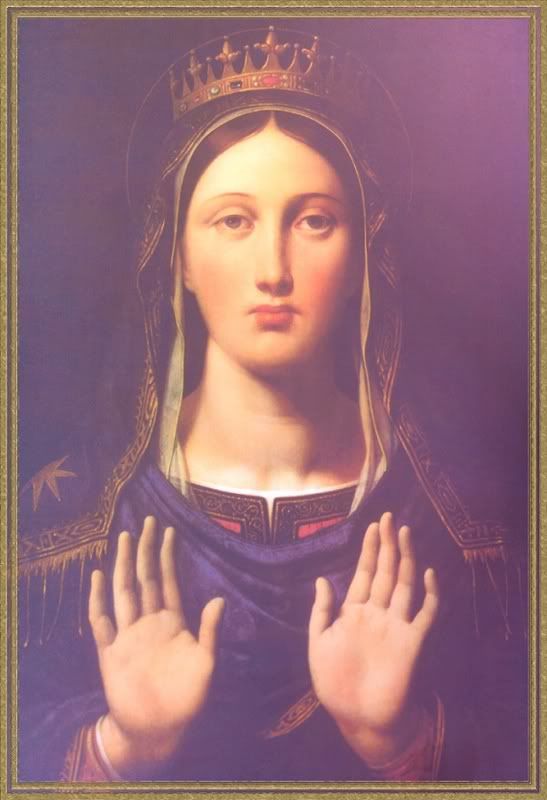
From The Glories Of Mary, by Saint Alphonsus Liguori:
I will address thee, O great Mother of God, in the words of St. Bernard: "Speak, O Lady, for thy Son heareth thee, and whatever thou askest thou wilt obtain" ("Loquere, Domina, quia audit Filius tuus; et quaecumque petieris, impetrabis"—Depr. Ad gl. V.)
Speak, speak, then, O Mary, our advocate, in favor of us poor miserable creatures. Remember that it was also for our good that thou didst receive so great power and so high a dignity. A God was pleased to become thy debtor by taking humanity of thee, in order that thou mightest dispense at will the riches of divine mercy to sinners.
We are thy servants, devoted in a special manner to thee; and I am one of these, I trust, even in a higher degree. We glory in living under thy protection. Since thou dost good to all, even to those who neither know nor honor thee, nay, more, to those who outrage and blaspheme thee, how much more may we not hope from thy benignity, which seeks out the wretched in order to relieve them, we who honor, love, and confide in thee?
We are great sinners, but God has enriched thee with compassion and power far exceeding our iniquities. Thou canst, and hast the will to save us; and the greater is our unworthiness, the greater shall be our hope in order to glorify thee the more in heaven, when by thy intercession we get there.
O Mother of mercy, we present thee our souls, once cleansed and rendered beautiful in the blood of Jesus Christ, but, alas, since that time, defiled by sin. To thee do we present them; do thou purify them. Obtain for us true conversion; obtain for us the love of God, perseverance, heaven.
We ask thee for much; but what is it? perhaps thou canst not obtain all? It is perhaps too much for the love God bears thee? Ah, no! for thou hast only to open thy lips and ask thy divine Son; he will deny thee nothing. Pray, then: and we shall with the same certainty obtain the kingdom of heaven.
Amen.
Labels: Restorationists
Tuesday, May 13, 2008
Daily Marian Prayer and Image During the Month Of May
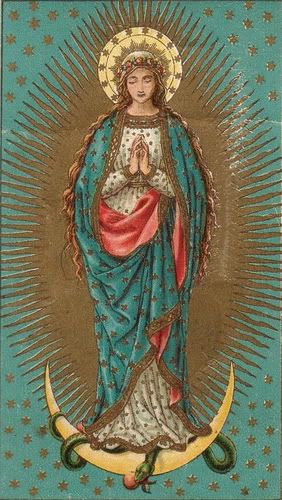
From The Glories Of Mary, by Saint Alphonsus Liguori:
O Queen and Mother of mercy, who dispensest graces to all who have recourse to thee with so much liberality, because thou art a Queen, and with so much love, because thou art our most loving Mother; to thee do I, who am so devoid of merit and virtue, and so loaded with debts to the divine justice, recommend myself this day.
O Mary, thou holdest the keys of all the divine mercies; forget not my miseries, and leave me not in my poverty. Thou art so liberal with all, and givest more than thou art asked for, O, be thus liberal with me.
O Lady, protect me; this is all that I ask of thee. If thou protectest me, I fear nothing. I fear not the evil spirits; for thou art more powerful than all of them. I fear not my sins; for thou by one word canst obtain their full pardon from God. And if I have thy favor, I do not even fear an angry God; for a single prayer of thine will appease him. In fine, if thou protectest me, I hope all; for thou art all-powerful.
O Mother of mercy, I know that thou takest pleasure and dost glory in helping the most miserable, and, provided they are not obstinate, that thou canst help them. I am a sinner, but am not obstinate; I desire to change my life. Thou canst, then, help me; O, help me and save me. I now place myself entirely in thy hands. Tell me what I msut do in order to please God, and I am ready for all, and hope to do all with thy help, O Mary�Mary my Mother, my light, my consolations, my refuge, my hope.
Amen. Amen. Amen.
Labels: Restorationists
Teenagers And Mass Ad Orientem
Father Longnecker recounts a recent conversation with some of the younger members of his flock about his new custom of saying Mass Ad Orientem some of the time.
There is hope.
There is hope.
Labels: Restorationists
Monday, May 12, 2008
Daily Marian Prayer And Image During the Month Of May
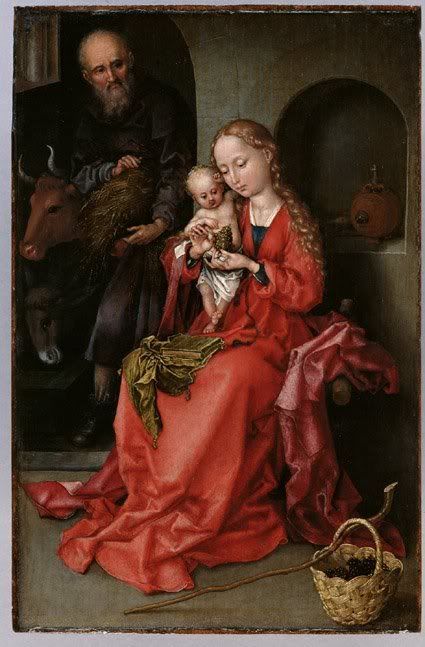
From The Glories Of Mary, by Saint Alphonsus Liguori:
O my soul, see what a sure hope of salvation and eternal life our Lord has given thee, by having in his mercy inspired thee with confidence in the patronage of his mother; and this, notwithstanding that so many times by thy sins thou hast merited his displeasure and hell.
Thank thy God, and thank thy protectress Mary, who has condescended to take thee under her mantle; for of this thou mayest be well convinced, after the many graces that thou hast received by her means. O yes, I do thank thee, my most loving Mother, for all thou hast done for me who am deserving of hell. And from how many dangers hast thou not delivered me, O Queen! How many inspirations and mercies hast thou not obtained for me from God! What service, what honor, have I ever rendered thee, that thou shouldst do so much for me? I know that it is thy sole goodness that has impelled thee.
O, too little would it be in comparison with all that I owe thee, did I shed my blood and give my life for thee; for thou hast delivered me from eternal death; thou hast enabled me, as I hope, to recover divine grace; to thee, in fine, I owe all I have.
My most amiable Lady, I, poor wretch that I am, can make thee no return but that of always loving and praising thee. Disdain not to accept the tender affection of a poor sinner, who is inflamed with love for thy goodness. If my heart is unworthy to love thee, because it is impure and filled with earthly affecgions, it is thou who must change it. Change it, then. Bind me to my God, and bind me so that I may never more have it in my power to separate myself from his love. Thou askest of me that I should love thy Godk, and I ask of thee that thou shouldst obtain this love for me, to love him always; this is all that I desire.
Amen.
Labels: Restorationists
Sunday, May 11, 2008
Mother's Day
Happy Mother's Day, to all the moms out there.
Mom's Lullabye
1 (to the tune of Brahms' Lullabye)
Go to bed, go to bed, I've had enough of your bullsh-t.
Close your eyes, you little monster, before I blister your behind.
I'll explain. You're a pain when you're tired and cranky.
I get cranky sometimes, too. It's cause I'm sick and tired of you
No, you can't, have one more drink.
No, I won't read you one more story!
I have had, it up to here.
I could use a drink myself.
2 ( to the tune of My Favorite Things)
Pampers and potties and runny red noses,
Babies are seldom a bed full of roses.
Whining and crying and carrying on,
This is what stinks about being a mom.
Babies are cute, but just when they're sleeping.
New mothers don't realize soon they'll be keeping
Hours that Dracula couldn't live on.
This is what stinks about being a mom.
When a toy breaks, when your back aches,
When you're feeling down,
Real moms ain't depressed when they see a big mess.
They just know there's a child around.
3 (tune of Over the Rainbow)
Let me go to the bathroom
All alone.
Let me watch some TV or talk on the telephone.
I hate Ernie and Burt,
And Barbie too.
I'm sick to death of the Smurfs, so give me a break, tonight.
I know how much you love me and
You know how much I love you dear
But, really!
Please my darling daughter
Won't you go and bug your father
I don't want you near me!
Let me sit down to eat let me rest a while.
I don't know if my feet could survive through another child.
Living with a kid like you
Is like being keeper of a zoo!
You should be in a cage!
Mom's Lullabye
1 (to the tune of Brahms' Lullabye)
Go to bed, go to bed, I've had enough of your bullsh-t.
Close your eyes, you little monster, before I blister your behind.
I'll explain. You're a pain when you're tired and cranky.
I get cranky sometimes, too. It's cause I'm sick and tired of you
No, you can't, have one more drink.
No, I won't read you one more story!
I have had, it up to here.
I could use a drink myself.
2 ( to the tune of My Favorite Things)
Pampers and potties and runny red noses,
Babies are seldom a bed full of roses.
Whining and crying and carrying on,
This is what stinks about being a mom.
Babies are cute, but just when they're sleeping.
New mothers don't realize soon they'll be keeping
Hours that Dracula couldn't live on.
This is what stinks about being a mom.
When a toy breaks, when your back aches,
When you're feeling down,
Real moms ain't depressed when they see a big mess.
They just know there's a child around.
3 (tune of Over the Rainbow)
Let me go to the bathroom
All alone.
Let me watch some TV or talk on the telephone.
I hate Ernie and Burt,
And Barbie too.
I'm sick to death of the Smurfs, so give me a break, tonight.
I know how much you love me and
You know how much I love you dear
But, really!
Please my darling daughter
Won't you go and bug your father
I don't want you near me!
Let me sit down to eat let me rest a while.
I don't know if my feet could survive through another child.
Living with a kid like you
Is like being keeper of a zoo!
You should be in a cage!
Labels: Annual Cycles
Daily Marian Prayer And Image During the Month Of May
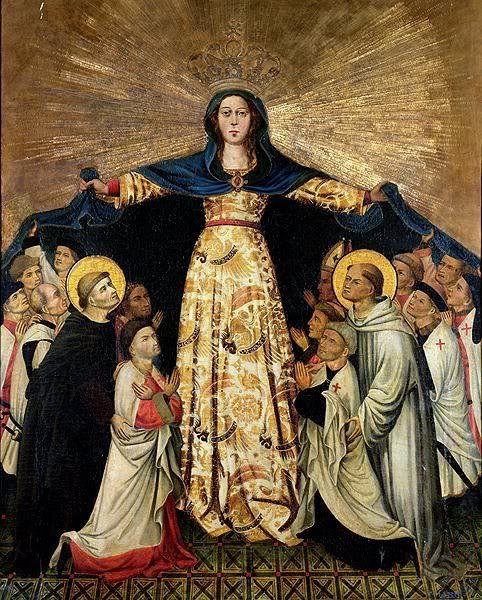
Behold at thy feet, O Mary my hope, a poor sinner, who has so many times been by his own fault the slave of hell. I know that by neglecting to have recourse to thee, my refuge, I allowed myself to be overcome by the devil. Had I always had recourse to thee, had I always invoked thee, I certainly should not have fallen.
I trust, O Lady most worthy of all our love, that through thee I have already escaped from the hands of the devil, and that God has pardoned me. But I tremble lest at some future period I may again fall into the same bonds. I know that my enemies have not lost the hope of again overcoming me, and already they prepare new assaults and temptations for me.
O, my Queen and refuge, do thou assist me. Place me under thy mantle; permit me not again to become their slave. I know that thou wilt help me and give me the victory, provided I invoke thee; but I dread lest in my temptations I may forget thee, and neglect to do so.
The favor, then, that I seek of thee, and which thou must grant me, O most holy Virgin, is that I may never forget thee, and especially in time of temptation; grant that I may then repeatedly invoke thee, saying, "O Mary, help me; O Mary, help me."
And when my last struggle with hell comes, at the moment of death, then, my Queen, help me more than ever, and thou thyself remind me to call on thee more frequently either with my lips or in my heart; that, being thus filled with confidence, I may expire with thy sweet name and that of thy Son Jesus on my lips; that so I may be able to bless thee and praise thee, and not depart from thy feet in Paradise for all eternity.
Amen.
Labels: Restorationists
Whitsunday

From The Liturgical Year, by Abbot Prosper Gueranger, OSB:
The great day, which consummates the work that God had undertaken for the human race, has at last shone upon the world. The days of Pentecost, as St. Luke says, are accomplished. We have had seven weeks since the Pasch; and now comes the day that opens the mysterious number of fifty. This day is the Sunday, already made holy by the creation of the light, and by the Resurrection of Jesus: it is about to receive its final consecration, and bring us the fullness of God.
In the old and figurative Law, God foreshadowed the glory that was to belong, at a future period, to the fiftieth day. Israel had passed the waters of the Red Sea, thanks to the protecting power of his Paschal Lamb! Seven weeks were spent in the desert, which was to lead to the promised land; and the very morrow of those seven weeks was the day whereon was made the alliance between God and His people. The Pentecost (the fiftieth day) was honoured by the promulgation of the ten commandments of the divine law; and every following year, the Israelites celebrated the great event by a solemn festival. But their Pentecost was figurative, like their Pasch: there was to be a second Pentecost for all people, as there was to be a second Pasch, for the Redemption of the whole world. The Pasch, with all its triumphant joys, belongs to the Son of God, the Conqueror of death: Pentecost belongs to the Holy Ghost, for it is the day whereon He began His mission into this world, which, henceforward, was to be under His Law.
But how different are the two Pentecosts! The one, on the rugged rocks of Arabia, amidst thunder and lightning, promulgates a Law that is written on tablets of stone; the second is in Jerusalem, on which God's anger has not as yet been manifested, because it still contains within its walls the first fruits of that new people, over whom the Spirit of love is to reign. In this second Pentecost, the heavens are not overcast, nor is the roar of thunder heard; the hearts of men are not stricken with fear, as when God spake on Sinai; repentance and gratitude are the sentiments now uppermost. A divine fire burns within their souls, and will spread throughout the whole world. Our Lord Jesus had said: 'I am come to cast fire on the earth; and what will I, but that it be kindled?' The hour for the fulfilment of this word has come: the Spirit of love, the Holy Ghost, the eternal uncreated Flame, is about to descend from heaven, and realize the merciful design of our Redeemer.
Jerusalem is filled with pilgrims, who have flocked thither from every country of the Gentile world. They feel a strange mysterious expectation working in their souls. They are Jews, and have come from every foreign land where Israel has founded a synagogue; they have come to keep the feasts of Pasch and Pentecost. Asia, Africa, and even Rome, have here their representatives. Amidst these Jews properly so called, are to be seen many Gentiles, who, from a desire to serve God more faithfully, have embraced the Mosaic law and observances; they are called proselytes. This influx of strangers, who have come to Jerusalem out of a desire to observe the Law, gives the city a Babel-like appearance, for each nation has its own language. They are not, however, under the influence of pride and prejudice, as are the inhabitants of Judea; neither have they, like these latter, known and rejected the Messias, nor blasphemed His works whereby He gave testimony of His divine character. It may be that they took part with the other Jews in clamouring for Jesus' death; but they were led to it by the chief priests and magistrates of the Jerusalem which they reverenced as the holy city of God, and to which nothing but religious motives have brought them.
It is the hour of Tierce, the third hour of the day, fixed from all eternity for the accomplishment of a divine decree. It was at the hour of midnight that the Father sent into this world, that He might take flesh in Mary's womb, the Son eternally begotten of Himself: so now, at this hour of Tierce, the Father and the Son send upon the earth the holy Spirit who proceeds from Them both. He is sent to form the Church, the bride and the kingdom of Christ: He is to assist and maintain her; He is to save and sanctify the souls of men; and this His mission is to continue to the end of time.
Suddenly is heard, coming from heaven, the sound of a violent wind; it startles the people in the city, it fills the cenacle with its mighty breath. A crowd is soon round the house that stands on Mount Sion; the hundred and twenty disciples that are within the building feel that mysterious emotion within them, of which their Master once said: 'The Spirit breatheth where He will, and thou hearest His voice'. Like that strange invisible creature, which probes the very depth of the sea and makes the waves heave mountains high, this Breath from heaven will traverse the world from end to end, breaking down every barrier that would stay its course.

The holy assembly have been days in fervent expectation; the divine Spirit gives them this warning of His coming, and they in the passiveness of ecstatic longing, await His will. As to those who are outside the cenacle, and who have responded to the appeal thus given, let us, for the moment, forget them. A silent shower falls in the house; it is a shower of fire, which, as holy Church says 'burns not but enlightens, consumes not but shines.' Flakes of fire, in the shape of tongues, rest on the heads of the hundred and twenty disciples; it is the Holy Ghost taking possession of all and each. The Church is now not only in Mary, but also in these hundred and twenty disciples. All belong now to the Spirit that has descended upon them; His kingdom is begun, it is manifested, its conquests will be speedy and glorious.
But let us consider the symbol chosen to designate this divine change. He who showed Himself under the endearing form of a dove, on the occasion of Jesus' baptism in the Jordan, now appears under that of fire. He is the Spirit of love; and love is not only gentle and tender, it is also ardent as fire. Now, therefore, that the world is under the influence of the Holy Ghost, it must needs be on fire, and the fire shall not be checked. And why this form of tongues? To show that the heavenly fire is to be spread by the word, by speech. These hundred and twenty disciples need but to speak of the Son of God, made Man, and our Redeemer; of the Holy Ghost, who renews our souls; of the heavenly Father, who loves and adopts us as His children: their word will find thousands to believe and welcome it. Those that receive it shall all be united in one faith; they shall be called the Catholic Church, that is, universal, existing in all places and times. Jesus had said: 'Go, teach all nations!' The Holy Ghost brings from heaven both the tongue that is to teach, and the fire (the love of God and of mankind), which is to give warmth and efficacy to the teaching. The tongue and the fire are now given to these first disciples, who, by the assistance of the holy Spirit, will transmit them to others. So will it be to the end of time.
An obstacle, however, opposes the mission at the very outset. Since the confusion at Babel, there have been as many languages as countries; communication by word has been interrupted. How, then, is the word to become the instrument of the world's conquest, and to make one family out of all these nations that cannot understand each other? Fear not: the holy Spirit is all-powerful, and has provided for this difficulty. With the other gifts, wherewith He has enriched the hundred and twenty disciples, He has given them that of understanding all languages, and of making themselves understood in every language. In a transport of holy enthusiasm, they attempt to speak the languages of all nations; their tongue and their ear take in, not only without effort, but even with charm and joy, this plenitude of word and speech which is to reunite mankind together. The Spirit of love has annulled the separation of Babel; men are once more made brethren by the unity of language.
How beautiful art thou, dear Church of our God! Heretofore, the workings of the Holy Ghost have been limited; but now, He breatheth freely where He willeth; He brings thee forth to the eyes of men by this stupendous prodigy. Thou art the image of what this earth was, when all its inhabitants spoke the same language. The prodigy is not to cease with the day of Pentecost, nor with the disciples who are its first receivers. When the apostles have terminated their lives and preaching, the gift of tongues, at least in its miraculous form, will cease, because no longer needed: but thou O Church of Christ! wilt continue to speak all languages, even to the end of time, for thou art to dwell in every clime. The one same faith is to be expressed in the language of every country; and thus transformed, the miracle of Pentecost is to be kept up for ever within thee, as one of thy characteristic marks.
The great St. Augustine alluded to this, when he spoke the following admirable words: 'The whole body of Christ, the Church, now speaks in all tongues. Nay, I myself speak all tongues, for I am in the body of Christ, I am in the Church of Christ. If the body of Christ now speaks all languages, then am I in all languages. Greek is mine, Syriac is mine, Hebrew is mine, and all are mine, for I am one with all the several nations that speak them.' During the ages of faith, the Church (which is the only source of all true progress), succeeded in giving one common language to all the nations that were in union with her. For centuries, the Latin language was the bond of union between civilized countries. However distant these might be from one another, there was this link of connexion between them; it was the medium of communication for political negotiations, for the spread of science, or for friendly epistolary correspondence. No one was a stranger, in any part of the west, or even beyond it, who could speak this language. The great heresy of the sixteenth century robbed us of this as of so many other blessings; it dismembered that Europe which the Church had united, not only by her faith, but by her language. But let us return to the cenacle, and continue our contemplation of the wondrous workings of the holy Spirit within this still closed sanctuary.
First of all, we look for Mary; for her who now, more than ever, is full of grace. After those measureless gifts lavished upon her in her Immaculate Conception; after the treasures of holiness infused into her by the Incarnate Word during the nine months she bore Him in her womb; after the special graces granted her for acting and suffering in union with her Son, in the work of the world's Redemption; after the favours wherewith this same Jesus loaded her when in the glory of His Resurrection: we should have thought that heaven had given all it could to a mere creature, however sublime the destiny of that creature might he. But no. Here is a new mission opened for Mary. The Church is born; she is born of Mary. Mary has given birth to the bride of her Son; new duties fall upon the Mother of the Church. Jesus has ascended into heaven, leaving Mary upon the earth, that she may nurse the infant Church. Oh! how lovely and yet how dignified, is this infancy of our dear Church, cherished as she is, fed, and strengthened by Mary! But this second Eve, this true Mother of the living, must receive a fresh infusion of grace to fit her for this her new office: therefore it is that she has the first claim to, and the richest portion of, the gifts of the Holy Ghost. Heretofore, He overshadowed her and made her Mother of the Son of God; now He makes her the Mother of the Christian people. It is the verification of those words of the royal prophet: 'The stream (literally, the impetuosity) of the river maketh the city of God joyful: the Most High hath sanctified His own tabernacle.' The Spirit of love here fulfils the intention expressed by our Redeemer when dying on the cross. 'Woman!' said Jesus to her, 'behold thy son!' St. John was this son, and he represented all mankind. The Holy Ghost now infuses into Mary the plenitude of the grace needful for her maternal mission. From this day forward, she acts as Mother of the infant Church; and when, at length, the Church no longer needs her visible presence, this Mother quits the earth for heaven, where she is crowned Queen; but there, too, she exercises her glorious title and office of Mother of men.
Let us contemplate this master-piece of Pentecost, and admire the new loveliness that beams in Mary from this new maternity. She is inflamed by the fire of divine love, and this in a way not felt before. She is all devoted to the office put upon her, and for which she has been left on earth. The grace of the apostolate is granted to her. She has received the tongue of fire; and although her voice is not to make itself heard in public preaching, yet will she speak to the apostles, directing and consoling them in their labours. She will speak, too, to the faithful, but with a force, a sweetness, and a persuasiveness, becoming one whom God has made the most exalted of His creatures. The primitive Christians, with such a training as this, will have vigour and energy enough to resist all the attacks of hell, and, like Stephen who had often listened to her inspiring words, to die martyrs for the faith.
Let us next look at the apostolic college. The frequent instructions they have been receiving from their Lord, during the forty days after His Resurrection, have changed them into quite other men; but now that they have received the Holy Ghost, the change and conversion is complete. They are filled with the enthusiasm of faith; their souls are on fire with divine love; the conquest of the whole world, this is their ambition, and they know it is their mission. What their Master had told them is fulfilled: they are endued with power from on high, and are ready for the battle. Who would suppose that these are the men who crouched with fear, when their Jesus was in the hands of His enemies? Who would take these to be the men that doubted of His Resurrection? All that this beloved Master has taught them is now so clear to them! They see it all, they understand it all. The Holy Ghost has infused into them, and in a sublime degree, the gift of faith; they are impatient to spread this faith throughout the whole earth. Far from fearing, they even long to suffer persecution in the discharge of the office entrusted to them by Jesus, that of preaching His name and His glory unto all nations.
Look at Peter. You easily recognize him by that majestic bearing, which, though sweetly tempered by deep humility, bespeaks his pre-eminent dignity. A few hours ago, it was the tranquil gravity of the head of the apostolic college; now, his whole face gleams with the flash of enthusiasm, for the Holy Ghost is now sovereign possessor of this vicar of Christ, this prince of the word, this master-teacher of truth. Near him are seated the other apostles: Andrew, his elder brother, who now conceives that ardent passion for the cross, which is to be his grand characteristic; John, whose meek and gentle eye now glistens with the fire of inspiration, betokening the prophet of Patmos; James, the brother of John, and called, like him, the son of thunder, bears in his whole attitude the appearance of the future chivalrous conqueror of Iberia. The other James, known and loved under the name of the brother of Jesus, feels a fresh and deeper transport of joyousness as the power of the Spirit thrills through his being. Matthew is encircled with a glowing light, which points him out to us as the first writer of the new Testament. Thomas, whose faith was the fruit he took from Jesus' wounds, feels that faith now made perfect; it is generous, free, unreserved, worthy of the brave apostle of the far east. In a word, all twelve are a living hymn to the glory of the almighty Spirit, whose power is thus magnificently evinced even at the outset of His reign.
The disciples, too, are sharers, though in a less degree than the apostles, of the divine gift; they receive the same Spirit, the same sacred fire, for they too, are to go forth, conquer the world, and found Churches. The holy women, also, who form part of the assembly of the cenacle, have received the graces of this wondrous descent of the Holy Ghost. It was love that emboldened them to stand near the cross of Jesus, and be the first to visit His sepulchre on Easter morning; this love is now redoubled. A tongue of fire has stood over each of them, and the time will come when they will speak, with fervid eloquence, of Jesus, to both Jews and Gentiles. The Synagogue will banish Magdalene and her companions: the Gentiles of our western Europe will receive them, and the word of these holy exiles will produce a hundredfold of fruit.
Meanwhile, a large crowd of Jews has collected round the mysterious cenacle. Not only has the 'mighty wind' excited their curiosity, but, moreover, that same divine Spirit, who is working such wonders upon the holy assembly within, is impelling them to visit the house, whereto is the new-born Church of Christ. They clamour for the apostles, and these are burning with zeal to begin their work; so, too, are all. At once, then, the crowd sees these men standing in its midst, and relating the prodigy that has been wrought by the God of Israel.
What is the surprise of this multitude, composed as it is of people of so many different nations, when these poor uneducated Galileans address them, each in the language of his own country? They have heard them speak before this, and they expected a repetition of the jargon now; when lo! there is the correct accent and diction of every country, and with such eloquence! The symbol of unity is here shown in all its magnificence. Here is the Christian Church; it is one, though consisting of such varied elements: the walls of division, which divine justice had set up between nation and nation, are now removed. Here, also, are the heralds of the faith of Christ; they are ready for their grand mission; they long to traverse the earth, and to save it by the word of their preaching.
But in the crowd there are some who are shocked at witnessing this heavenly enthusiasm of the apostles. 'These men,' say they, 'are full of new wine!' It is the language of rationalism, explaining away mystery by reason. These Galileans, these 'drunken men', are, however, to conquer the whole world to Christ, and to give the Holy Ghost, with His enebriating unction, to all mankind. The holy apostles feel that it is time to proclaim the new Pentecost; yes, this anniversary of the old is a fitting day for the new to be declared. But in this proclamation of the law of mercy and love, which is to supersede the law of justice and fear, who is to be the Moses? Our Emmanuel, before ascending into heaven, had selected one of the twelve for the glorious office: it is Peter, the rock on whom is built the Church. It is time for the shepherd to show himself and speak, for the flock is now to be formed. Let us hearken to the Holy Ghost, who is about to speak by His chief organ to this wondering and attentive multitude. The apostle, though he speaks in one tongue, is understood by each of his audience, no matter what his country and language may be. The discourse is, of itself, a guarantee of the truth and divine origin of the new law.
The fisherman of Genesareth thus pours forth his wondrous eloquence: 'Ye men of Judea, and all you that dwell in Jerusalem, be this known to you, and, with your ears, receive my words! For these are not drunk, as you suppose, seeing it is but the third hour of the day. But this is that which was spoken of by the prophet Joel: "And it shall come to pass in the last days, saith the Lord, I will pour out of my Spirit upon all flesh: and your sons and your daughters shall prophesy, and your young men shall see visions, and your old men shall dream dreams. And upon my servants indeed, and upon my handmaids, will I pour out, in those days of my Spirit, and they shall prophesy." Ye men of Israel, hear these words: Jesus of Nazareth, a Man approved of God among you, by miracles and wonders and signs, which God did by Him in the midst of you, as you also know. This same being delivered up, by the determinate counsel and foreknowledge of God, you, by the hands of wicked men, have crucified and slain. Whom God hath raised up, having loosed the sorrows of hell (the tomb), as it was impossible that He should be holden by it. For David saith concerning Him: "My flesh shall rest in hope, because Thou wilt not leave my soul in the tomb, nor suffer Thy holy One to see corruption." Ye men, brethren, let me freely speak to you of the patriarch David: that he died and was buried, and his sepulchre is with us to this day. Whereas, therefore, he was a prophet, he spoke of the Resurrection of Christ; for neither was He left in the tomb, neither did His flesh see corruption. This Jesus hath God raised again, whereof all we are witnesses. Being exalted by the right hand of God, and having received of the Father the promise of the Holy Ghost, He hath poured forth this which you see and hear. Therefore, let all the house of Israel know most certainly, that God hath made both Lord and Christ this same Jesus, whom you have crucified.'
Thus did the second Moses promulgate the new Law. How must his hearers have welcomed the stupendous gift of this new Pentecost, which put them in possession of the divine realities foreshadowed by that figurative one of old. Here again, it was God revealing Himself to His creatures, and, as usual, by miracles. Peter alludes to the wonders wrought by Jesus, who thus bore testimony to His being the Messias. He tells his audience that the Holy Ghost has been sent from heaven, according to the promise made to
this Jesus by His Father: they have proof enough of the great fact, in the gift of tongues of which they themselves are witnesses.
The holy Spirit makes His presence and influence to be felt in the hearts of these favoured listeners. & few moments previously they were disciples of Sinai, who had come from distant lands to celebrate the by-gone Pasch and Pentecost; now they have faith, simple and full faith, in Christ. They repent of the awful crime of His death, of which they have been accomplices; they confess His Resurrection and Ascension; they beseech Peter and the rest of the apostles to put them in the way of salvation: 'Men and brethren!' say they, 'what shall we do?' Better dispositions could not be: they desire to know their duty, and are determined to do it. Peter resumes his discourse, saying: 'Do penance, and be baptized, every one of you, in the name of Jesus Christ, for the remission of your sins; and you shall receive the gift of the Holy Ghost. For the promise is to you, and to your children, and to all that are afar off, whomsoever the Lord our God shall call.'
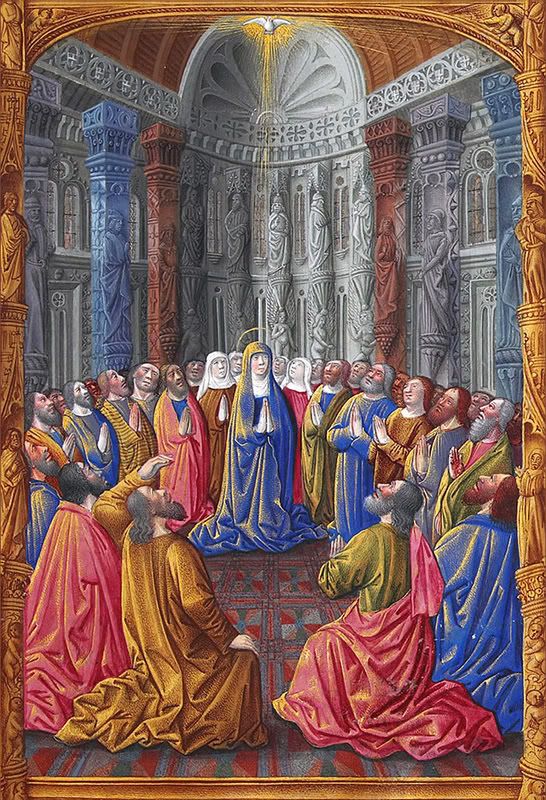
The Jewish Pentecost pales at each word of the new Moses; the Christian Pentecost manifests itself with clearer light. The reign of the Holy Ghost is inaugurated in Jerusalem, and under the very shadow of that temple which is doomed to destruction. Peter continued his instructions; but the sacred Volume has left us only these few words, wherewith, probably, the apostle made his final appeal to his hearers: 'Save yourselves from this perverse generation!
These children of Israel had to make this sacrifice, or they never could have shared in the graces of the new Pentecost: they had to cut themselves off from their own people; they had to leave the Synagogue for the Church. There was a struggle in many a heart at that moment; but the Holy Spirit triumphed; three thousand declared themselves disciples of Christ, and received the mark of adoption in holy Baptism. Church of the living God! how lovely art thou in thy first reception of the divine Spirit! how admirable is thy early progress! Thy first abode was in the Immaculate Mary, the Virgin full of grace, the Mother of God; thy second victory gave thee the hundred and twenty disciples of the cenacle; and now, three thousand elect proclaim thee as their mother, and, leaving the unhappy Jerusalem, will carry thy name and kingdom to their own countries. To-morrow, Peter is to preach in the temple, and five thousand men will enroll themselves as disciples of Jesus of Nazareth. Hail! then, dear creation of the Holy Ghost! Militant on earth; triumphant in heaven; beautiful, noble, immortal Church, all hail! And thou, bright Pentecost! day of our truest birth! how fair, how glorious, thou makest these first hours of Jesus' bride on earth! The divine Spirit thou givest us, has written, not upon stone, but upon our hearts, the Law that is to govern us. In thee, O Pentecost! we find realized the hopes foreshadowed in the mystery of the Epiphany; for though thou thyself art promulgated in Jerusalem, yet thy graces are to be extended to all that are afar off, that is, to us Gentiles. The Magi came from the east; we watched them as they visited the crib of the divine Babe, for we knew that we, too, were to have our season of grace. It was thou, O holy Spirit! that didst attract them to Bethlehem: and now, in this Pentecost of Thy power, Thou callest all men; the star is changed into tongues of fire, and the face of the earth is to be renewed. Oh! grant that we may be ever faithful to the graces thou offerest us, and carefully treasure the gifts sent us, with Thee and through Thee, by the Father and the Son!
The mystery of Pentecost holds so important a place in the Christian dispensation, that we cannot be surprised at the Church's ranking it, in her liturgy, on an equality with her paschal solemnity. The Pasch is the redemption of man by the victory of Christ; Pentecost is the Holy Ghost taking possession of man redeemed. The Ascension is the intermediate mystery; it consummates the Pasch, by placing the Man-God, the Conqueror of death, and our Head, at the right hand of the Father; it prepares the mission of the Holy Ghost to our earth. This mission could not take place until Jesus had been glorified, as St. John tells us; and several reasons are assigned for this fact by the holy fathers. It was necessary that the Son of God, who, together with the Father, is the principle of the procession of the Holy Ghost in the divine essence, should also personally send this divine Spirit upon the earth. The exterior mission of one of the Three Persons is but the sequel and manifestation of the mysterious and eternal production which is ever going on within the Divinity. Thus the Father is not sent, either by the Son or by the Holy Ghost, because He does not proceed from them. The Son is sent to men by the Father, of whom He is eternally begotten. The Holy Ghost is sent by the Father and the Son, because He proceeds from both. But, in order that the mission of the Holy Ghost might give greater glory to the Son, there was a congruity in its not taking place until such time as the Incarnate Word should be enthroned at the right hand of the Father. How immense the glory of human nature, that it was hypostatically united to the Person of the Son of God when this mission of the Holy Ghost was achieved! and that we can say, in strict truth, the Holy Ghost was sent by the Man-God!
This divine mission was not to be given to the Third Person, until men were deprived of the visible presence of Jesus. As we have already said, the hearts of the faithful were henceforward to follow their absent Redeemer by a purer and wholly spiritual love. Now, who was to bring us this new love, if not He who is the link of the eternal love of the Father and the Son?
This holy Spirit of love and union is called, in the sacred Scriptures, the 'Gift of God'; and it is on the day of Pentecost that the Father and Son send us this ineffable Gift. Let us call to mind the words spoken by our Emmanuel to the Samaritan woman at the well of Sichar: 'If thou didst know the Gift of God!’ He had not yet been given, He had not yet been manifested, otherwise than in a partial way. From this day forward, He inundates the whole earth with His fire, He gives spiritual life to all, He makes His influence felt in every place. We know the Gift of God; so that we have but to open our hearts to receive Him, as did the three thousand who listened to St. Peter's sermon.
Observe, too, the season of the year, in which the Holy Ghost comes to take possession of His earthly kingdom. Our Jesus, the Sun of justice, arose in Bethlehem in the very depth of winter; humble and gradual was His ascent to the zenith of His glory. But the Spirit of the Father and the Son came in the season that harmonizes with His own divine characteristic. He is a consuming Fire; He comes into the world when summer is in its pride, and sunshine decks our earth with loveliest flowers. Let us welcome the life-giving heat of the Holy Ghost, and earnestly beseech Him that it may ever abide within us. The liturgical year has brought us to the full possession of truth by the Incarnate Word; let us carefully cherish the love, which the Holy Ghost has now enkindled within our hearts.
The Christian Pentecost, prefigured by the ancient one of the Jews, is of the number of the feasts that were instituted by the apostles. As we have already remarked, it formerly shared with Easter the honour of the solemn administration of Baptism. Its octave, like that of Easter, and for the same reason, ended with the Saturday following the feast. The catechumens received Baptism on the night between Saturday and Sunday. So that the Pentecost solemnity began on the vigil, for the neophytes at once put on their white garments: on the eighth day, the Saturday, they laid them aside.
In the middle-ages, the feast of Pentecost was called by the beautiful name of 'The Pasch of roses,' just as the Sunday within the octave of the Ascension was termed the 'Sunday of roses'. The colour and fragrance of this lovely flower were considered by our Catholic forefathers as emblems of the tongues of fire, which rested on the heads of the hundred and twenty disciples, and poured forth the sweet gifts of love and grace on the infant Church. The same idea suggested the red-coloured vestments for the liturgical services during the whole octave. In his Rational (a work which abounds in most interesting information regarding the mediوval liturgical usages), Durandus tells us that, in the thirteenth century, a dove was allowed to fly about in the church, and flowers and lighted tow were thrown down from the roof, during the Mass on Whit Sunday; these were allusions to the two mysteries of Jesus' baptism, and of the descent of the Holy Ghost on the day of Pentecost.
At Rome, the station is in the basilica of St. Peter. It was but just that special honour should be paid to the prince of the apostles, for it was on this day that his preaching won three thousand converts to the Church. Though the station, and the indulgences attached to it, are at St. Peter's, yet the sovereign Pontiff and the sacred college of Cardinals solemnize to-day's service in the Lateran basilica, which is the mother-church of the city and of the world.
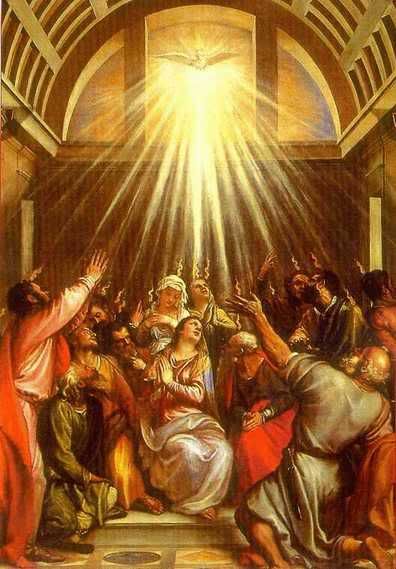
Veni, Sancte Spiritus,
et emitte caelitus
lucis tuae radium.
Veni, pater pauperum,
veni, dator munerum
veni, lumen cordium.
Consolator optime,
dulcis hospes animae,
dulce refrigerium.
In labore requies,
in aestu temperies
in fletu solatium.
O lux beatissima,
reple cordis intima
tuorum fidelium.
Sine tuo numine,
nihil est in homine,
nihil est innoxium.
Lava quod est sordidum,
riga quod est aridum,
sana quod est saucium.
Flecte quod est rigidum,
fove quod est frigidum,
rege quod est devium.
Da tuis fidelibus,
in te confidentibus,
sacrum septenarium.
Da virtutis meritum,
da salutis exitum,
da perenne gaudium.
Amen. Alleluia.
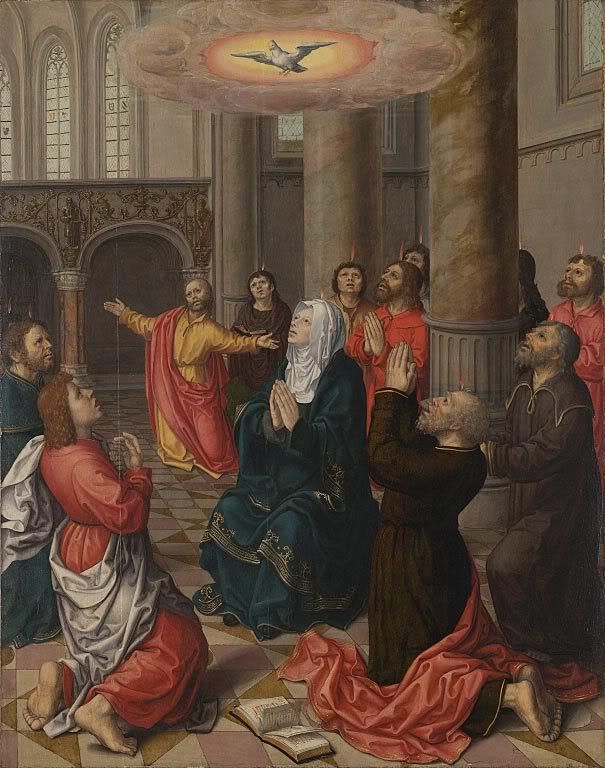
Labels: Restorationists







































































































